‘If Joomla! is Linux, then WordPress is Mac OS X. WordPress might offer only 90% of the features of Joomla!, but in most cases WordPress is both easier to use and faster to get up and running.’
Over the course of the last few years, I’ve been in charge of putting up a number of websites for various companies, often as favors for friends. In most cases, I’ve ended up using one out of two solutions: Joomla! and WordPress. While both of these projects have evolved greatly over the last few years, they are vastly different. Joomla! has always been intended as a ‘fit-all-your-possible-needs’-kind of CMS solution, while WordPress was developed as a blog with CMS capabilities. Recently WordPress has opened up to allow its users to set up a site with static-only material (with the option of a blog-page), without having to hack the code. Hence it’s one step closer to being a direct competitor to Joomla!.
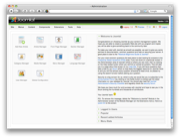 |
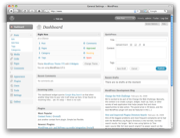 |
I will probably step on a few peoples feelings here, but I will argue that Joomla! is an example of a poorly managed open source project and that WordPress is a very successfully managed one. Certainly I don’t mean that Joomla! is a useless piece of junk, but that the lead developers have quite a bit to learn from WordPress. The main thing that Joomla! is vastly behind on is usability. While it is true that Joomla! 1.5 is a step in the right direction, it is still light years behind WordPress. Let me illustrate with two examples of common tasks.
Example 1: Create a blog-post with an image
Joomla!
- From the ‘Control Panel,’ click ‘Add New Article.’
- There are two image buttons. If you use the wrong one, you won’t be able to upload an image (as you will only browse the existing images). You must use the one below the text field.
- Select a ‘Title,’ the right ‘Section’, and then the right ‘Category.’
- Write the content and save.
WordPress
- Select QuickPress in the Dashboard.
- Click on the image icon and upload the image.
- Select title, write your content and press publish.
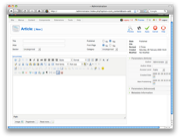 |
 |
Example 2: Create a static page accessible from the menu
Joomla!
- From the ‘Control Panel,’ click ‘Add New Article.’
- Select a ‘Title,’ the right ‘Section’, and then the right ‘Category.’
- Write the content and save it.
- From the top-menu, select ‘Menu’ and ‘Main Menu’ (assuming you want to add it to the main menu.)
- Click ‘New.’
- Select ‘Internal link,’ and ‘Articles,’ and then finally ‘Article Layout.’
- Fill in the title of the object as well as the parent item.
- In the column to the right, you now need to browse your list of articles and select the desired article.
- Press ‘Save.’
WordPress
- From the Dashboard, click ‘Pages.’
- Select ‘Add New.’
- Fill in the title and contents.
- Select the parent item (if other than root.)
- Click ‘Publish.’
 |
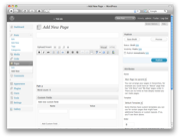 |
Let’s step back for a minute and imagine the following scenario: you’re in charge of putting up a website for a company. They might want to put up about 10 or so pages with various information. According to my experience this is a pretty common situation. You can do this with either Joomla! or WordPress – both are fully capable of delivering this. Assuming you’re going to buy a template to solve the design issue, it will probably take you about an hour with either of the software to get to the first draft (assuming you’ve been working with them in the past.) So far so good. This is where they start to differ. With WordPress you’re pretty much done by now. However, with Joomla!, you’ll probably have to spend another hour or two just trying to re-organize the different modules to fit the template you bought (in many cases, just to get the basics to work.) Next you will end up spending even more time trying to figure out how to re-organize the different menus. You need to link up a particular document to a particular menu-entry (as illustrated above.) If you want a blog-feed, you need to set up a dedicated section or category (I still don’t really know the difference between the two.) Moreover, you need to select the ‘style’ of blog you want.
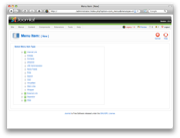 |
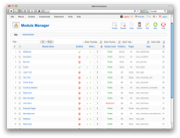 |
in Joomla! |
Let’s say you managed to figure all of that out and that you got the site ready. Now it’s time to hand over the site to the customer. There will obviously be some training involved, and here’s another crucial difference between Joomla! and WordPress. Training someone to learn WordPress takes (in my experience) less than 30 minutes, and they truly understand it. Training someone to use Joomla! takes at least an hour, and they still don’t really understand it.
Again, I’m not saying that Joomla! is useless, it’s that WordPress is a more intuitive piece of software. Let me throw an analogy out there that will probably help you better understand my point. If Joomla! is Linux, then WordPress is Mac OS X. WordPress might offer only 90% of the features of Joomla!, but in most cases WordPress is both easier to use and faster to get up and running. I use and love Linux, it just doesn’t have that elegant touch to Mac OS X does.
To Joomla!’s defense, there are at least two scenarios I can think of where Joomla! is a better fit than WordPress. The first one would be eCommerce. If you install VirtueMart on Joomla! you can be up running with an eCommerce site pretty quickly. However, the problem is that it does not feel like it is a part of Joomla!, but rather as a 3rd party module that works in Joomla! (which is pretty much what it is.) The second one would be a site where you need to have multiple levels of permissions (ie. an extranet). WordPress only offers three levels of permission (public, private, and password protected), while Joomla! is much more flexible.
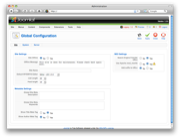 |
 |
in Joomla! |
in WordPress |
Joomla! is not doomed. It just has a long way to go when it comes to usability. WordPress has really been developed by the KISS-principle, while Joomla! appears to have been developed to solve every problem on Earth (by engineers, for engineers). Going back to the two problems I mentioned above, where Joomla! beats WordPress. I think it would actually be less of a challenge to add support for eCommerce and more permission levels to WordPress, than it would be to improve the usability in Joomla! to reach WordPress’ level.
Just as a side note, a quick line-count on the latest versions of both software reveals that Joomla 1.5.9 has 350,975 lines of codes, while WordPress 2.7.1 has a mere 159,682 (might not be completely accurate, but that’s what ‘wc -l’ said). Hence, even if WordPress only offers 70% of the features of Joomla!, which I am pretty sure it does, their code is written much more efficiently.
Author: Viktor Petersson Tags: internet, Joomla, open source, usability, WordPress

Do you know where I can find an up to date comparison chart of Joomla 1.5.9 and WordPress 2.7? The charts I’ve found so far are using WP 2.2 as the comparison which will not be accurate with the amount of improvements that came with 2.7.
By the way – I agree with you on your thoughs about the development of WP vs Joomla. I definitely prefer the KISS-designed interface that WP has over Joomla any day! Thanks for your post!
Lisa,
I haven’t seen any comparison chart between the two, and I agree with you, it would be interesting to study. If you come across one, let me know. If not, maybe that make a good ‘Part 2.’
It is very difficult to compare WordPress and Joomla because they are very different applications. Line counts are really quite meaningless (because I could just as easily argue that Joomla is 10 times more powerful than WP in many ways, therefore it’s 5 times better on the line count – see how that doesn’t compute). WordPress is purpose built for blogger style sites. Joomla is a platform in which to run Content Management extensions (articles, catalogs, magazines, ecommerce, galleries, etc). There is no “contest” per se because they do different things and both respectively well in my opinion. If you want a simple blog site, stick with WordPress. If you need to extend your site later, go with something more robust like Joomla (or even Drupal).
Actually, thinking about it your operating system analogy should be this. Joomla is a iMac, WordPress is an top end iPod. To argue which one plays your favourite song quicker isn’t the point – they are different devices.
Andrew,
You’re missing the point. The point was that Joomla! is too focused on fitting every possible need on the planet, that it forgot about the user experience. You’re right though, Joomla! can do many things that WordPress can’t (as I pointed out in the article), but that doesn’t mean that you can’t develop by the KISS principles and with the user experience in mind.
Again, Joomla! is like Linux, and WordPress is like Mac OS X. Joomla! is more powerful, but lacks the elegant touch.
Joomla is best for managing content.
There is no way we compare Joomla and WordPress.
Colmparing the two means that you were never in front of complex situation beyond the simple publishing of static contents.
Joomla! does not only serv to solve the issue of multilevel permissions, or ecommerce,etc.
The whole WordPress application can be modeled with a mere Joomla component.
Joomla has a powerful and scalable architecture whereby you can solve complex situations. It is then natural to have mush bigger code base and much bigger complexity.
If usability ineterests you in term of how to add content, menu item, etc, I really find this unsound. As a website creator, my primary requirement will be a plateform that help me achieve usability from the point of view of the website user. It a plateform that provides the necessary complex architecture, tools needed to achieve custom, adaptative, usable, layout, content organisation,etc.
In another term, if I have to choose between two plateform, one providing me with an easy/usable administration interface but with a less configuartions and customization possiblities, and the other having a complex but with much more customizations poissibilities, then naturally i will look for the latter !!
Potatosoftware,
First, I don’t really agree with you. WordPress offers both Widgets and Plugins for expansion. Sure, they might not offer all the functionality of Joomla!, but it does offer quite some flexibility with the recent releases.
Your argument is basically that yes, Joomla! is complicated to administrate, but it works.
My point is that you don’t need to sacrifice usability just because you offer many features. I’m not saying that WordPress can do everything Joomla! does. All I’m saying is that when it comes to usability and both back-end and front-end design, WordPress is ahead in the game.
At the end of the day, on a daily basis, you don’t move around modules etc. All you do is to add and modify contents. Hence that should be easy. If you set up a site for a customer, you want it to be as easy to add content that John Doe, without a degree in CS, can figure it out.
One of the best multi-lingual cms that I have seen to date is Elxis. It is similar to Joomla but the menus are easier to use and more direct. I think that my site is a good example. Elxis is open source and can be downloaded at elxis.org.
An interesting opinion, I like people who stick to their guns. I personally choose Joomla over WordPress for most projects that require more than simple content management. The problem that I find people have with Joomla! first off the bat is related to ‘pages’. However I don’t think this is really the fault of Joomla!. WordPress has pages and posts, but Joomla! really doesn’t operate that way. Often people think of a CMS as an online method of making pages like you would in Word, but this style is not employed by Joomla for good reasons. I don’t believe that Joomla is not user friendly, its that people largely have very static ideas about how content is to be managed. Someone who understands that will pick up Joomla without any problem, others will struggle. The underlying principles of content management are what make it difficult, not the tools that are built upon it. WordPress provides only some of the tools, which if Joomla replicated a similar system, it would not be worth anything anymore.
I also disagree with the analogy. The main reason is that the author seem to be mixing usability with elegance. I have used OS X, and Windows, and find them both equally perplexing and confusing at times. However, I usually find OS X more elegant in its approach (which is what most of your examples point out about WP). How easy is it to add a link to WP that points to an external page? In Joomla its a menu type that is easy to find and use, but in WP it is more difficult to mange your linkage. Usability is not directly related to elegance.
I could point out some flaws with WP, such as managing extensions (you never know exactly where the settings will be…), but that leads us to the fault of extensions. Joomla! has an extension for nearly everything, often multiple in fact, and WP has an ever growing list itself. I find the biggest faults in usability fall to the extension developers, who don’t always make things simple and clear. Some are really great and easy to use, but some have strange menu systems and require one to learn a new customization process.
Really the biggest thorn in the side of usability with most CMSs is probably the extensions/plugins/whatever you want to call them.
I didn’t miss the point, and the operating system analogy is not at the right level. Usability goes both ways. WP is not very usable for doing some of the heavy lifting that Joomla is capable of (and that heavy lifting comes at a price). But where you have overlap, certainly WP probably does seem simpler and take less clicks to do some, maybe many things. But the point is WP is not trying to be Joomla and Joomla is not trying to be WP. However, I will say that I *can* create a virtually perfect clone of WP in Joomla, but you can’t do it the other way around. I think it’s already being worked on actually … ;)
the argument here concerns usability ie. J.Doe, who does not care what’s under the hood but wants to get the job done with fewer clicks and not paying thru the nose.
How about upgrading the software? Does Joomla require you to remove almost all the code before you put in the new code and then restore from backup when you goofed?
I know for some people the automatic wordpress upgrade works, but I still have to do it by hand. As someone who’s used to the linux “apt-get update;apt-get dist-upgrade” for my whole machine, I find the wordpress upgrade very clumsy.
I tried Joomla and gave up.
I will try wordpress. (I didnt know about it)
Thanks
WordPress 2.7 now have an update on click to the next version. It is very easy now to update to the latest version, and not require a technical person for it.
WP have tone’s of plugin. I have to admin that I did not use Joomla because until now at WP I found all what I was looking for (just for blog posts).
It always pains me when people compare things, software included, by their size.
Statements like “less lines = more efficient” pain me even more. What less lines generally means is: less comments in the code!
I have been programmer all my life, doing all kinds of software from embedded assembly code to JSP on the net.
I have been toying with Joomla for the past years or so just a little. I have two Joomla books. I can’t think of an application meant for general users which is more unintuitive.
Joomla is very impressive, and appears to work well. But it is nearly impossible to figure out how to make a page look like you want without a lot of learning.
I’m sure the Joomla developers can justify the bizarre ways you must learn to get your site to look like you want. But I agree wholehearted with this blog posting. They should have worked much harder on making it easier for people to pick up and run with it. If you are going to make your program work differently than everybody else’s, then you have to do some thinking about the new user’s experience.
I am a huge fan of wordpress and I have developed many big, complex sites using it. It does have it problems, such as plugins not being compatible with WP upgrades, but that’s not an actual WP issue, it’s a developer issue.
However currently I only really offer clients the wordpress solution. I therefore have been researching an alternative CMS and Joomla! seems to be the most popular and tested option.
Has anyone got any thoughts on the best open source CMS out there currently? I am guessing it is infact Joomla!?
I did log onto the demo account and I did find the admin panel very confusing, but I guess its like all off of these things, until you really get under the bonnet and get used to something, it always is a little tricky
A comparison between a full featured CMS and a blog software? WordPress offers 90% of Joomla’s features? You are kidding, aren’t you?
WordPress is probably the best (free) blogging solution out there in the www, but if you have to use other features (ecommerce, communities, mediaportals, social networks), CMS’ like Drupal or Joomla are the way to go.
Before saying “you are missing the point” please keep in mind creating a website for one of the above mentioned features costs much more effort when trying to extend WP rather than using a full CMS from the very beginning. This comparison is useless since these contestants are made for different purposes.
I love that I just stumbled on to this. I just recently tried creating a new website first with Joomla. My husband used this and I’ve been quite impressed with it’s capabilities and the fact that it’s open source. However after spending almost 6 hours watching and reading tutorials I became frustrated and turned to WordPress. Had my site started within an hour. If ever I’m looking for a carrier change I might actually take the time to learn Joomla but in the mean time I’m sticking with WordPress.
Thanks for the article whish I would have read it first.
this is the new way to drive traffic to your site: oversimplify a topic and say something controversial, especially regarding CMS vs. CMS, language vs. language, OS vs OS, etc.
You clearly don’t have a good understanding and yet you write so authoritatively as if you do. Kudos to you sir.
Comparing WP to Joomla is like comparing an iPod touch to a smart phone. Yea they both have touch screens, yes they both can play music, yes they can both surf the mobile web but the smart phone is designed to do SO much more where the touch is designed to be a fancy MP3 player
Boz,
Right. I agree. Usability is the most important thing. Most users really couldn’t care less about what’s underneath the hood.
Laura Conrad,
If you want to compare upgrades between Joomla! and WordPress, I must say WordPres beats Joomla!. I just performed an upgrade from 2.7.0 to 2.7.1 with a click of a button. I know that Joomla! is supposed to have a similar feature, but every time I’ve tried it, I’ve been forced to manually upload the patch in the end.
Miss Kath,
You’re right, but the lines of codes was not really the main point of the article, it was merely a side note.
Odin,
You’re right. Claiming that WordPress has 90% of the features of Joomla! is probably a stretch.
aj,
No, it’s certainly not a way to just drive traffic to the site. I think I bring up an important point. Even some people in the Joomla! community appear to agree. The point of the article is that just because the system is complex, it doesn’t mean simple tasks needs to be complex.
Having peaked under the hood of both pieces of software, I think the analogy continues there as well.
Joomla was written the way everybody wrote web code a few years ago. I know. I wrote my own CMS way back when, and when I look at Joomla I can see how the decisions were made to deal with the same questions I had to deal with.
WordPress, and some other newer packages (the ecommerce package Magento Commerce comes to mind) have code that has been thought out in advance. I don’t think that could have been done without being able to see older software just to figure out how not to do certain things. The advantage of clean, scalable, maintainable code is that you can easily build a clean, scalable, maintainable interface on top of it.
Sorry, spelling error. Should have said “peeked”.
This is good stuff. It makes me wonder if a future offering will be a market offering many possible, _usable_ “front-ends” to a technology-only CMS.
It amazes me that Joomla can build a tool for building websites that doesn’t include an abstraction called a “page”. Instead, you set page name and layout on menu entries.
How about this: pages have a name and a layout, and menus take you to pages. This simple change would make Joomla far easier to use!
I find it difficult to put any stock in an article that has a Joomla versus WordPress theme when the article was written by someone that does not even know the difference between Joomla’s Sections and Categories… obviuosly the author doesn’t really have a clue about Joomla, thus rendering the article as pretty much useless.
Sorry, but that’s my $0.02.
As an aside, pretty much every WordPress site that I see has a similar layout, now that is boring.
judging from both sides argument, people who are more computer savvy and understand things like how MVC boosts long-term productivity, customizability and maintainability and why there are more joomla developers and components and support out there- these people will go with joomla, and they should.
General users who just want to see what they have typed appear on the Internet now! will go with WP- because it is easier to do.(kinda like blackberry vs iphone.. no, ipod.., no really..)
And yes if, there is a component that integrates WP right into joomla, so that it adopts joomla’s template and can be configured from within joomla, etc. etc. and the site benefits from the Joomla universe- I wonder what kind of comment you have w.r.t this particular point.. lol,
This is my first winter here and i say OSS users, unite!
@Roberto Jommla suffers from reinventing the wheel and createing pointless new terminalogy.
this week I have to show 3 members of how to use Joomla ok to edit a footer you go into this menue called modules.
ok the Austin Alegro had a square wheel but its still a dog of A Car
Love this article, I am just about to choose between the two for a quick set up systme for a site.
The “Add New Page in WordPress” thumb links to the wrong image though.
Strike that, my bad. Was confused!
We forgive you, lol..
I like WordPress. I put up a WP site for the Mrs. She loves it. It’s easy for her purposes. I commented about this topic in a blog post by Brian Teeman over here: http://tinyurl.com/dhchof
I did have some frustration when customizing her site but this is a developer issue, not a user issue. I know there’ll be a few WordPress gurus reading this post. Maybe one of you can help me out with this issue over here http://tinyurl.com/b44a5w
I had run a magazine site in Joomla 1.0 for two years. The upgrade path from 1.0 to 1.5 was so utterly horrendous that I turned to WP in despair. Following the instructions did not get me close to an upgrade on Joomla – it always died half way through with no meaningful feedback. There was nothing I could do to drag it into 1.5 short of starting the whole site again from scratch.
So I tried WP. And it just works. It all just works. My non-technical users can get their content up and running immediately without my help. They even understand the hacks necessary to get WP working as a magazine. I’m never going to consider (or recommend) Joomla again.
On Drupal 4.7 (ancient). Drupal is now 6.10
Example 1:
1. Select Blog entry in Create content
2. Type title, write content
3. Drag-and-drop or upload image
4. Click Submit
Example 2:
1. Select Page in Create content
2. Fill in the title and content
3. Select the parent item under Menu
4. Click Submit
I’ll stick to drupal and get a very viable CMS with a very powerful taxonomy engine.
Drupal
I TOTALLY AGREE! I’m building a site in Joomla right now and it is suuuuuch a pain. I’ve told people time and time again that I’m so tired of having to crack open up a module and hack it to make it work correctly.
If Joomla could adopt the WordPress ease of use, I think they would become a much more powerful open source CMS.
Joomla definitely needs a better revenue model, that’s for sure. If they did, maybe we would see a better product.
After using WordPress for several years to manage the articles on my site, I decided I was ready to migrate to something a little more robust, and chose Joomla. I moved all my content into it, and used it for a year or so—and then, I migrated all the content back to WordPress again.
I wanted to like Joomla. I tried really hard to like it, but I found it incredibly inflexible, and not very intuitive. I was frustrated by a constant stream of bugs, and ovewhelmed by fixes that required me to open core files to make repairs.
My readers did not try really hard to like Joomla, and my mailbox was filled with angry messages from readers who weren’t having a good experience on the site.
WordPress is simple and infinitely flexible. I use it three completely different ways on my three sites, and I never have to think very hard if I want to configure it to do something unusual. There’s plenty of documentation to help me, and a large community to spell things out in smaller words if I can’t do it on my own.
Joomla made work for me. WordPress just works for me.
Roberto,
“obviuosly the author doesn’t really have a clue about Joomla, thus rendering the article as pretty much useless.”
Ok, I respect your opinion. That’s fine. I didn’t work on the code base, but I have used Joomla! since version 1.0.x and I think I represent the average user fairly well. And I if I can’t figure it out, I’m pretty sure I’m not alone.
Alister,
I agree. I have a site myself running Joomla! 1.0.x that I really want to upgrade. I made a test in of the upgrade on a lab server and was experiencing the exact same thing.
I did an upgrade from an ancient version of WordPress to the latest version the other day. No hick-ups and the upgrade was done in less than 30 minutes with barely any downtime.
ugarit,
Thanks for the addition. In retrospect it would probably have been a good idea to also cover Drupal. Unfortunately I have very limited experience of using it.
I use both for projects and having a strong grounding in usability I couldn’t agree more that WordPress has better usability than Joomla. WordPress is much loved by my clients and they wish every other piece of software they use would be as usable.
I use Joomla when the client needs multiple layers of user privileges and content, and a proper user registration system, this is the WordPress Achilles heal!
Hi there,
I tried Joomla and it scared me. It was very hard to do the basics things.
WordPress it awesome, a few minutes is all I need to get up and running. Plugins are really cool and can make things interesting.
Joomla and WordPress are under GNU GPL Licences hence are both more Linux like than MacOX.
Again, WP is easy to setup and use – go with it if your website will never get any more complex than a blog with standard features.
If you will need a larger set of features in future, or will need to customise it and make it unique –> TAKE TIME to learn Joomla before you start saying how you had problems and issues working with it, etc. etc. Especially Joomla 1.5.x, it is shockingly easier (than Joomla 1.0.x) to develop for and customise because of MVC model and the new event stack. Trust me, I know.
OR install Joomla with WP in it- yes its out there..
The reason there are so many pro-WP comments on this blog is because the average public is not computer savvy. I am familiar with the Joomla design and philosophy – it is superior by design. So both WP and Joomla serve different needs, this tendency to force them into the same race either is a web-traffic generation scheme or a way of venting frustration after suffering under the hands of something more technical than you can handle.. hehehehe.
sorry, couldnt resist a jab..
Your “Example 2″ is very misleading. You can add a content item to a menu in Joomla! on the same page as you edit the content. No need to add the content, then go and edit the menu.
I do however agree with the ease-of-use sentiment. People can “use” wordpress easily – they struggle with understanding Joomla!
WordPress has a massive advantage with it’s auto-update functionality. Trying to update Joomla! is a definite developers job
What about loading speed of the pages? I find that Joomla take longer to load than WordPress.
What a good comparison saying Joomla is Linux while WordPress is Mac OS :)
I have been using WordPress for quite sometime but there are limitation in terms of CMS. I would say WordPress is BMS (Blog Management System). In terms of e-commerce, it is definitely possible in WordPress with fantastic plugin, but Joomla seems to win over wordpress in terms of e-commerce system.
One thing that WordPress is lacking is the functionality but joomla is lacking in userability.
For instance, when i setup a love blog – Cupid Blogger Dot Com a couple of months back, initially planned to use Joomla as CMS but decided to use WordPress. The reason is simple because WordPress has lots of contributor in terms of themes and plugin (no matter free or paid) but Joomla is lacking of that.
And for me to work on Joomla, it is just like i need to break my nerve to understand a system that is designed by engineers for engineers. Unlike WordPress, everyone can master and use it easily.
I’ve been a WordPress user for quite a while. Every once in a while I’ll say to myself “You should really learn Joomla or Drupal”. So I’ll start to use it for a site I’m developing and after an hour or so of enabling modules, customizing settings, and clicking around the endless admin panels to get it to do what WordPress does out of the box, I give up. It’s just not worth it. In some cases, I’ve built an eCommerce CMS from scratch just because I didn’t want to deal with these bloated systems.
Thanks for the cool tips. I have been a huge user of wordpress and just recently transferred to joomla.
This post is on usability of Joomla! vs. WordPress, not on whether one of them has the abilty to calculate the amount of oxygen in the universe.
As far as that comparison goes, this post is spot-on. Joomla! is rubbish when it comes to usability. I am currently developing some financial plugins and components on joomla! by the way – so I’m not against it at all.
It’s just that I wish it was as easy to use for the novice as wordpress. I would then have less support calls and anger directed towards my complicated solutions from clients who couldn’t – and shouldn’t have to – care less about the difference between a plugin, module and component.
Btw I have been playing with WordPress for only a couple of weeks now because I had become frustrated with some aspects of joomla! I went under the wp hood and I haven’t seen anything about it that could prevent me from developing any kind of solution on it. (It has mvc capabilities too)
The biggest plus for wordpress is that it does not have an unneccessarily complex and sluggish routing system. It feels like bloatware. While I believe the intentions behind joomla are noble, there’s a lot to be learned from wordpress.
That goes for you too Drupal community. been there, done that.
I think there something should be changed on this article. That is “If Joomla is Linux, then Drupal ( Not WordPress ) is Mac OS X”